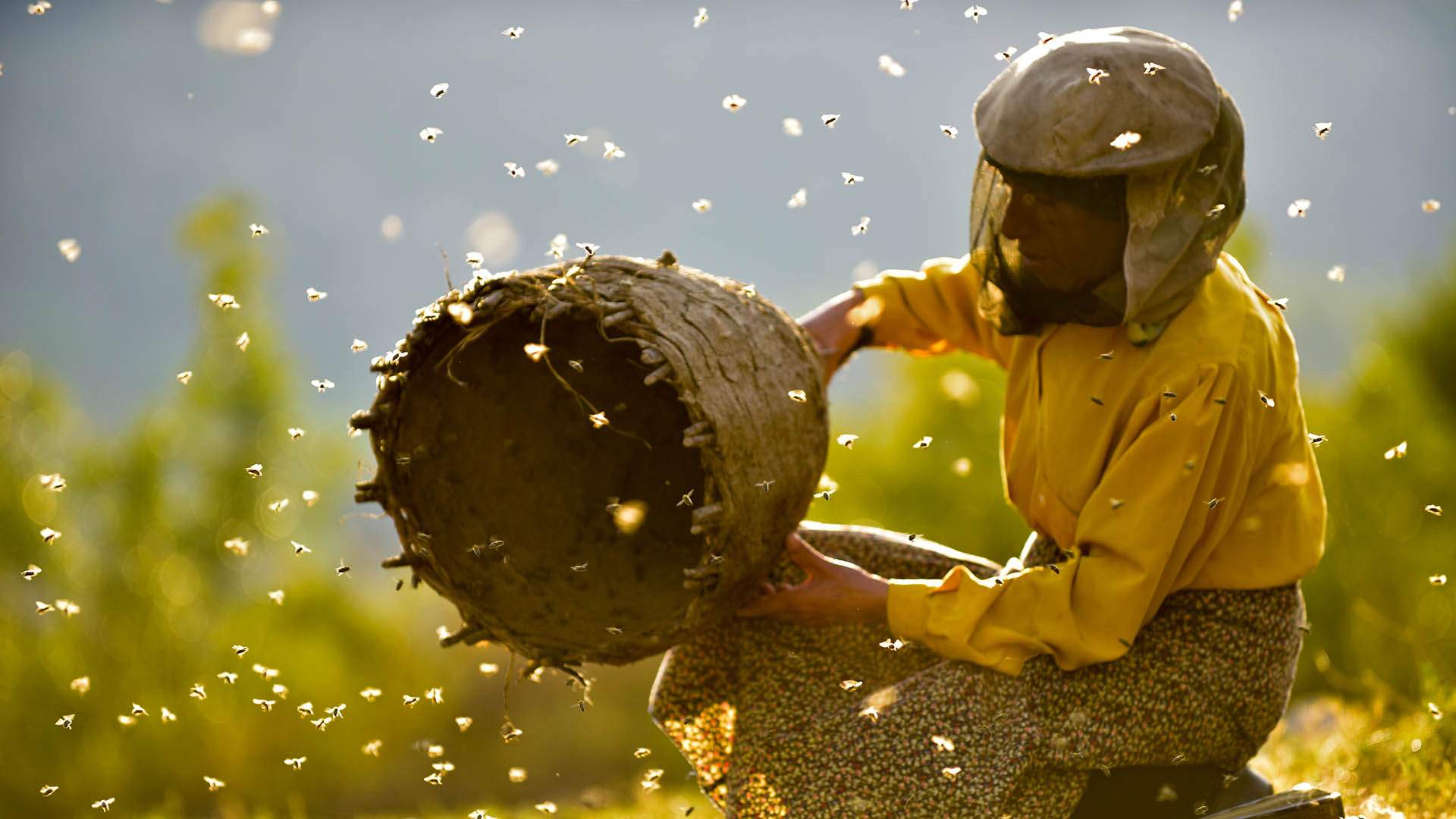Honeyland
Nominated for two Oscars and picking up multiple Sundance awards, this compelling and fascinating doco follows Europe's last female wild beekeeper.
Overview
In Honeyland's opening moments, Hatidže Muratova performs feats that wouldn't be out of place in an action blockbuster. Against the craggy, sun-parched North Macedonian landscape — vistas that could easily provide the backdrop to a Star Wars movie or Mad Max: Fury Road — she scrambles over rocks and creeps along ledges, making her way from her stone and mud hut to the cliffs near her otherwise desolate rural village. There, with her green floral headscarf contrasting against pale walls, she tends to a hive of bees. Hatidže doesn't always wear protective gear, but the insects don't sting her. Pulling out the gleaming honeycomb, she's careful and respectful as she goes about her task. That also comes through in the phrase she repeats like a mantra: "half for me, half for you".
Hatidže is the main point of focus in Honeyland, a multiple award-winner at the 2019 Sundance Film Festival that also became the first-ever movie to receive Oscar nominations for both Best International Film and Best Documentary earlier this year. In this intimate observational doco, she's worlds away from cinema's big-budget spectacles — but she's still a daring superhero. Dedicated to traditional apiary methods, Hatidže is the last female wild beekeeper in Europe. That mightn't mean much when audiences start watching Tamara Kotevska and Ljubomir Stefanov's debut feature-length film, but it will when the credits roll. As will those words that Hatidže keeps mentioning, which sum up her approach. When she removes honey from her hives, to bottle raw and sell at markets four hours away in the capital city of Skopje, she leaves as much as she takes so that her bees still have something to feed on.
Filmed over three years, with Kotevska and Stefanov's team recording more than 400 hours of footage, Honeyland steps into Hatidže's daily life — and the bees aren't the only things buzzing. At first, the film's indefatigable protagonist splits her time between harvesting honey and caring for her bed-ridden, partly blind octogenarian mother Nazife, their banter brimming with both honesty and affection. Then, in a wave of movement and noise that's an omen for things to come, a family of nine moves in next door. Together, the Muratovas and their new neighbours are the only inhabitants of their village. But the Sams have completely different tactics for working the land, whether they're tending to the cows they trucked in with them or — initially under Hatidže's advice — beekeeping themselves.
With so many mouths to feed and, as the movie conveys in its bee-on-the-wall fashion, a struggling existence to begin with, Sam patriarch Hussein has no time or concern for Hatidže's "take half, leave half" methodology. Kotevska and Stefanov's obviously didn't know that this clash would arise when they started filming Hatidže. They couldn't have predicted that the Sams would show up at all, in fact. However, in demonstrating how age-old practices and modern tactics come into conflict, they couldn't have stumbled upon a more pertinent situation. Hussein needs cash, and as much as he can make, with selling honey for €10 a jar seeming like a gold mine. Hatidže needs her beekeeping to remain sustainable, so she can continue on as she has been year after year, and as many an apiarist has before her. Unsurprisingly, the two approaches hardly complement each other.
Honeyland explores an overwhelmingly specific feud, but it speaks to a universal conflict — between the old and new, tradition and contemporary thinking, and living with nature versus exploiting it. Hatidže's life is all about balance with the planet around her, and yet it's so easily turned upside down by someone who couldn't care less because there's desperately needed money to be made. As a result, this distinctive snapshot also speaks to much of the modern world's current problems, with Hatidže's experiences filled with obvious parallels. Kotevska and Stefanov don't judge Hussein and the Sam family, but their whirlwind of chaos inherently sits in stark contrast to the Muratovas' modest setup. The juxtapositions keep coming, there for viewers to see frame by frame — in the boisterous kids lassoing unhappy cattle, the tender way that Hatidže sings to her hives, the mess and mayhem of the Sams' property, and the peacefulness of Hatidže and Nazife's humble abode.
There's more to Hatidže's story on a personal level, as slowly and meditatively unfurled in a documentary with many purposes, including presenting a detailed character study. Audiences need to understand her work and the problems she's facing to understand who she is — to truly glean the weight of her choices and regrets, too — and both facets of Honeyland are as gripping as they are fascinating. This is a compelling, clear-eyed portrait of a woman who is just as frank and unflinching, and who has taken each facet of her existence as it comes. The filmmakers want viewers to do the same, of course. Taking in their stunning drone-shot views of Hatidže in her formidable surroundings, peering closely at bees going about their business, listening to her candle-lit chats with her mother and simply watching her face, it's impossible not to.





